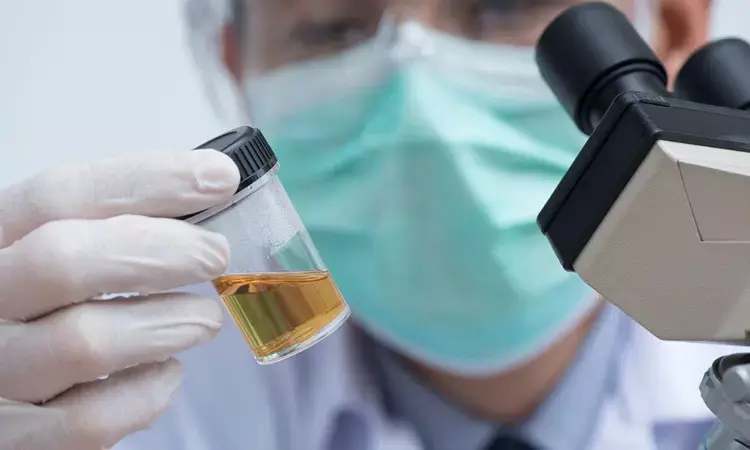- Home
- Medical news & Guidelines
- Anesthesiology
- Cardiology and CTVS
- Critical Care
- Dentistry
- Dermatology
- Diabetes and Endocrinology
- ENT
- Gastroenterology
- Medicine
- Nephrology
- Neurology
- Obstretics-Gynaecology
- Oncology
- Ophthalmology
- Orthopaedics
- Pediatrics-Neonatology
- Psychiatry
- Pulmonology
- Radiology
- Surgery
- Urology
- Laboratory Medicine
- Diet
- Nursing
- Paramedical
- Physiotherapy
- Health news
- Fact Check
- Bone Health Fact Check
- Brain Health Fact Check
- Cancer Related Fact Check
- Child Care Fact Check
- Dental and oral health fact check
- Diabetes and metabolic health fact check
- Diet and Nutrition Fact Check
- Eye and ENT Care Fact Check
- Fitness fact check
- Gut health fact check
- Heart health fact check
- Kidney health fact check
- Medical education fact check
- Men's health fact check
- Respiratory fact check
- Skin and hair care fact check
- Vaccine and Immunization fact check
- Women's health fact check
- AYUSH
- State News
- Andaman and Nicobar Islands
- Andhra Pradesh
- Arunachal Pradesh
- Assam
- Bihar
- Chandigarh
- Chattisgarh
- Dadra and Nagar Haveli
- Daman and Diu
- Delhi
- Goa
- Gujarat
- Haryana
- Himachal Pradesh
- Jammu & Kashmir
- Jharkhand
- Karnataka
- Kerala
- Ladakh
- Lakshadweep
- Madhya Pradesh
- Maharashtra
- Manipur
- Meghalaya
- Mizoram
- Nagaland
- Odisha
- Puducherry
- Punjab
- Rajasthan
- Sikkim
- Tamil Nadu
- Telangana
- Tripura
- Uttar Pradesh
- Uttrakhand
- West Bengal
- Medical Education
- Industry
SGLT2 inhibitor dapagliflozin significantly impacts urine metabolome in diabetics: Study

Greece: Dapagliflozin treatment is associated with a significant change in urine metabolome in patients with type 2 diabetes (T2D) independent of glucose-lowering, finds a recent study. According to the study results, published in the Journal of Clinical Endocrinology & Metabolism, most of the observed changes can be considered beneficial and may contribute to the renoprotective properties of dapagliflozin.
Sodium-glucose cotransporters-2 (SGLT2) inhibitors have cardio- and renoprotective properties. However, there are no determinate underlying mechanisms. Evdoxia Bletsa, Third Internal Medicine Department, General Hospital of Nikaia, Athens, Greece, and colleagues, therefore, conducted the study to evaluate the effect of dapagliflozin on renal metabolism assessed by urine metabolome analysis in patients with type 2 diabetes.
For this purpose, the researchers performed a prospective cohort study in an outpatient diabetes clinic of a tertiary academic center. Eighty patients with hemoglobin A1c > 7% on metformin monotherapy were prospectively enrolled.
Fifty patients were treated with dapagliflozin for 3 months. 30 patients treated with insulin degludec were used for comparison, to exclude that the changes observed in urine metabolome were merely the result of the improvement in glycemia.
Changes in urine metabolic profile before and after the administration of dapagliflozin and insulin degludec were assessed by proton-nuclear magnetic resonance spectroscopy.
Key findings of the study include:
- In multivariate analysis urine metabolome was significantly altered by dapagliflozin (R2X = 0.819, R2Y = 0.627, Q2Y = 0.362, and coefficient of variation analysis of variance, P < 0.001) but not insulin.
- After dapagliflozin, the urine concentrations of ketone bodies, lactate, branched chain amino acids, betaine, myo-inositol, and N-methylhydantoin were significantly increased.
- Additionally, the urine levels of alanine, creatine, sarcosine, and citrate were also increased whereas anserine decreased.
"Dapagliflozin significantly affects urine metabolome in patients with type 2 diabetes in a glucose lowering-independent way. Most of the observed changes can be considered beneficial and may contribute to the renoprotective properties of dapagliflozin," wrote the authors.
"Further studies are needed to confirm our results and to explore the mechanisms that underlie them," they concluded.
Reference:
The study titled, "Effect of Dapagliflozin on Urine Metabolome in Patients with Type 2 Diabetes," is published in the Journal of Clinical Endocrinology & Metabolism.
DOI: https://academic.oup.com/jcem/advance-article/doi/10.1210/clinem/dgab086/6139141
Dr Kamal Kant Kohli-MBBS, DTCD- a chest specialist with more than 30 years of practice and a flair for writing clinical articles, Dr Kamal Kant Kohli joined Medical Dialogues as a Chief Editor of Medical News. Besides writing articles, as an editor, he proofreads and verifies all the medical content published on Medical Dialogues including those coming from journals, studies,medical conferences,guidelines etc. Email: drkohli@medicaldialogues.in. Contact no. 011-43720751


